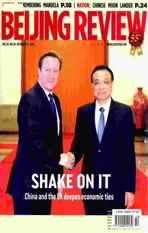Medical Insurance Reform
2013-04-29
The surplus of Chinas basic medical insurance funds for urban residents had reached 764.4 billion yuan ($125.5 billion) by the end of 2012. As officials from National Health and Family Planning Commission suggested, every year since 1999, with the exception of 2010, the surplus ratio of basic medical insurance funds for urban residents has been above 20 percent, hitting a peak of 35 percent in 2001. In developed countries, the rate averages at below 10 percent. That indicates improvements should be made in the management and usage of medical insurance funds.
As opposed to the huge amount of idle medical insurance funds, complaints about low reimbursement rates have not eased. Many people cant afford medical expenses, and some families even go bankrupt attempting to pay them. On the other hand, there are extensive concerns over risks of embezzlement and misappropriation.
The huge amount of idle funds reveals deep-seated problems in the management mechanisms for medical insurance funds. Efforts should be made to innovate management concepts, enhance capital efficiency, further ensure the interests of the insured and deepen reforms of institutional mechanisms.
During the Third Plenary Session of the 18th Central Committee of the Communist Party of China, the Decision on Major Issues Concerning Comprehensively Deepening Reform proposed to coordinate the basic medical insurance system for urban and rural residents. It stipulated that farmers in rural areas should be treated equally with urban residents; and at the same time, authorities should speed up the integration of medical insurance funds nationwide, and create a national medical insur- ance network encompassing workers, urban and rural residents, enabling free flow of medical insurance funds nationwide.
This way, progress will be seen in the coordination and deployment of the funds, and illegal actions like embezzlement will be effectively eliminated. Moreover, the insured will be able to seek medical treatment and get reimbursed anywhere in the country, which will encourage free migration of labor.
The government should substantially increase reimbursement proportions and reduce the financial burdens of the insured. Currently, reimbursement proportions for outpatient service, being hospitalized and serious disease treatment are all no more than 65 percent.
Medical insurance is a type of public service. Only when it is provided and dominated by the government, can it run smoothly and efficiently. The government should increase medical subsidies for urban and rural residents. Currently, social security only makes up less than 20 percent of the total financial budget, lagging far behind some developed countries.
Meanwhile, enterprises and individuals should not be required to pay more for medical insurance. The contribution rate of Chinas employers and employees to social security ranks 13th among all the countries in the world. If the rate is raised further, personal financial burdens will be increased, and employers will face greater operation pressures. That explains why the decision suggested reducing the rate of social insurance.
